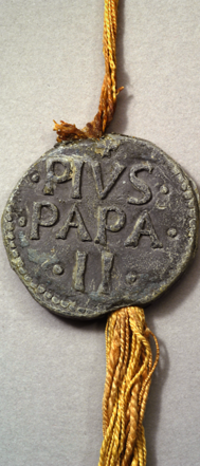The founding of the university
In November 1459, the Basel City Council managed to obtain a founding charter for the new university from Pope Pius II. Only five months later, on 4 April 1460, a ceremonial founding mass was held, with the bishop and former mayor jointly declaring the university to be open.
In establishing this new institution, its promoters built upon their experiences with the earlier Council University. They had taken advantage of the new political and personal constellations after Duke Albrecht VI had left the Austrian Anterior Lands, and thus also Freiburg, in 1458; Arnold von Rotberg, the bishop of Basel and designated chancellor of the University of Freiburg, had died; and the University of Freiburg had received its statutes in a ceremonial act. When, in the summer of the same year, Aeneas Silvius Piccolomini was elected as Pope Pius II, the people of Basel saw that their chance to found their own university had come. The City Council made efforts at the papal curia, thereby competing with the Habsburgs and Freiburg, whose own newly founded university began its operations three weeks after Basel.
In Basel, lectures in all four faculties began the day after the opening ceremony, i.e., on 5 April 1460. Success had thus been rapidly achieved after the granting of papal privilege in November 1459 in resolving the controversial question of whether a university should be founded at all, and in initiating significant conceptual planning. Just five months after the papal privilege was granted, the first phase of the project’s realization culminated successfully with the opening ceremony on 4 April. Not two months later, on 28 May 1460, the City Council issued the Letter of Freedoms, the statutes for the new institution, granting it the usual privileges. And finally, on 6 September of the same year, the rector and the university declared in return, with the Compacta and Concordata, not to abuse these privileges.
From the outset, the new university saw a considerable influx of students, as documented in the rector’s registers maintained from the very beginning. Despite major funding problems, the institution, once established, was able to develop successfully in the years that followed.



